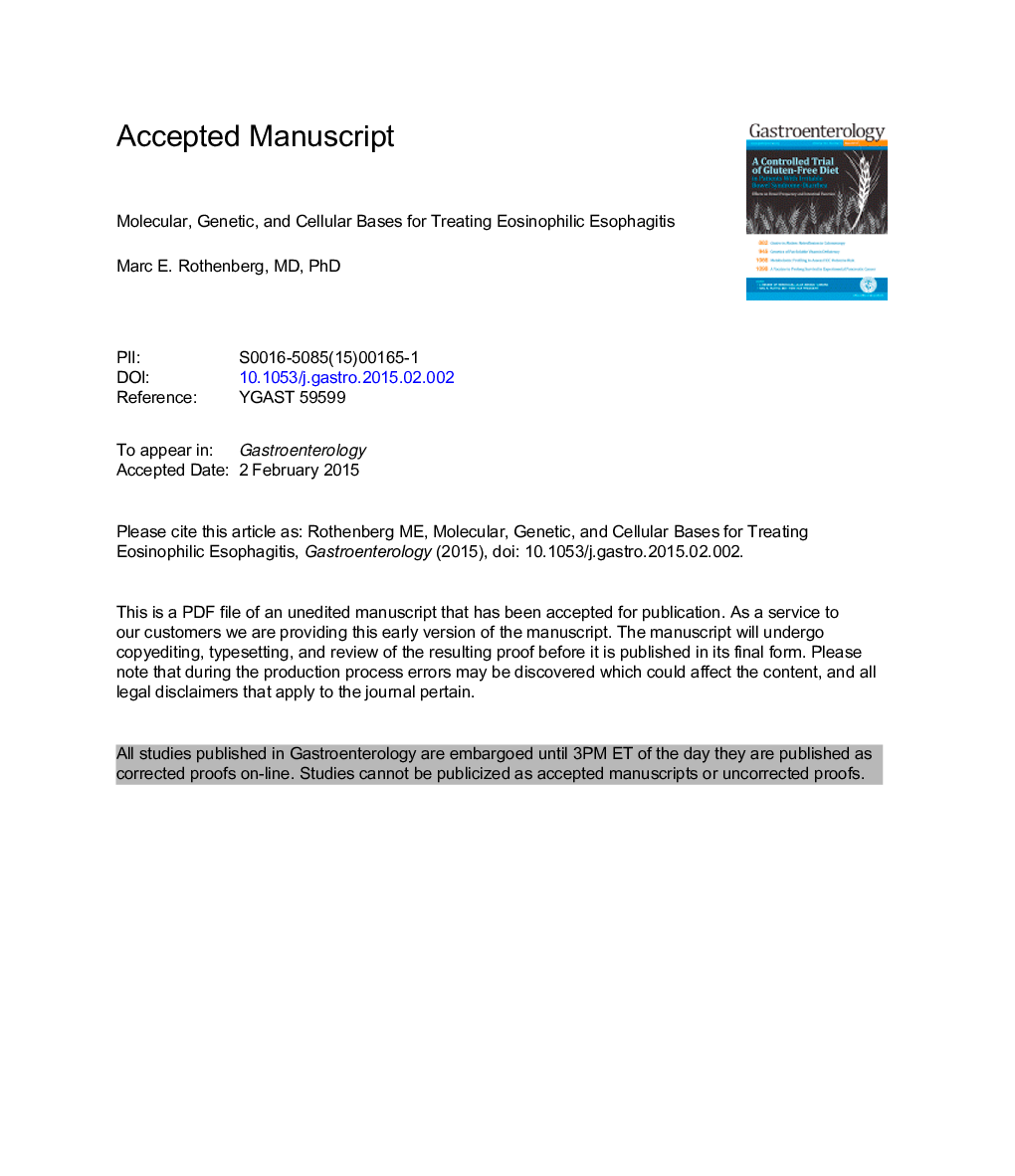| کد مقاله | کد نشریه | سال انتشار | مقاله انگلیسی | نسخه تمام متن |
|---|---|---|---|---|
| 6093650 | 1209791 | 2015 | 38 صفحه PDF | دانلود رایگان |
عنوان انگلیسی مقاله ISI
Molecular, Genetic, and Cellular Bases for Treating Eosinophilic Esophagitis
ترجمه فارسی عنوان
مولکولی، ژنتیک و سلولهای پایه ای برای درمان بیماری ایزوفیزیک ائوزینوفیلی
دانلود مقاله + سفارش ترجمه
دانلود مقاله ISI انگلیسی
رایگان برای ایرانیان
کلمات کلیدی
TSLPEoELDSECPTGFPHTSMIRCTDREEEPOEDNSAMmRNAPPITh2messenger RNA - RNA messengerAllergy - آلِرژیSTAT - آمارeosinophil peroxidase - ائوزینوفیل پراکسیدازEosinophils - ائوزینوفیلهاConnective tissue disorder - اختلال بافت متصلEoE, Eosinophilic esophagitis - ازوفاژیت ائوزینوفیلیکEsophagitis - اسفافیتinterleukin - اینترلوکینEpithelium - بافت پوششی، اپیتلیومtransforming growth factor - تبدیل فاکتور رشدDiagnostics - تشخیصTherapy - درمانCytokines - سیتوکین هاThymic stromal lymphopoietin - لنفوپیتین استروما تیمیکBarrier - مانعSignal transducer and activator of transcription - مبدل سیگنال و فعال کننده رونویسیGenome-wide association studies - مطالعات مرتبط با ژنومGWAS - مطالعهٔ همخوانی سراسر ژنومProton pump inhibitor - مهار کننده پمپ پروتونMicroRNA - میکرو RNA Eosinophil-derived neurotoxin - نوروکسین مشتق شده از ائوزینوفیلT-helper type 2 - نوع T-helper 2Eosinophil cationic protein - پروتئین کاتیونی EosinophilGenetics - ژنتیک
موضوعات مرتبط
علوم پزشکی و سلامت
پزشکی و دندانپزشکی
بیماریهای گوارشی
چکیده انگلیسی
Eosinophilic esophagitis (EoE) was historically distinguished from gastroesophageal reflux disease on the basis of histology and lack of responsiveness to acid suppressive therapy, but it is now appreciated that esophageal eosinophilia can respond to proton pump inhibitors. Genetic and environmental factors contribute to risk for EoE, particularly early-life events. Disease pathogenesis involves activation of epithelial inflammatory pathways (production of eotaxin-3 [encoded by CCL26]), impaired barrier function (mediated by loss of desmoglein-1), increased production and/or activity of transforming growth factor-β, and induction of allergic inflammation by eosinophils and mast cells. Susceptibility has been associated with variants at 5q22 (TSLP) and 2p23 (CAPN14), indicating roles for allergic sensitization and esophageal specific protease pathways. We propose that EoE is a unique disease characterized by food hypersensitivity; strong hereditability influenced by early-life exposures and esophageal-specific genetic risk variants; and allergic inflammation and that the disease is remitted by disrupting inflammatory and T-helper type 2 cytokineâmediated responses and through dietary elimination therapy.
ناشر
Database: Elsevier - ScienceDirect (ساینس دایرکت)
Journal: Gastroenterology - Volume 148, Issue 6, May 2015, Pages 1143-1157
Journal: Gastroenterology - Volume 148, Issue 6, May 2015, Pages 1143-1157
نویسندگان
Marc E. Rothenberg,
